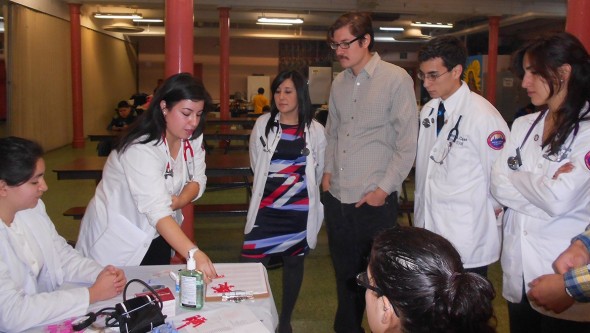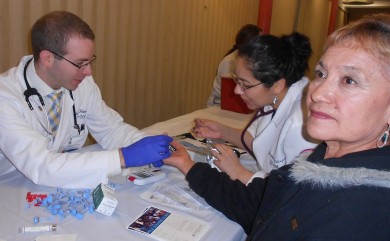Medical students bring free health screenings to Pilsen

AnnaKaren Morelos (second from left) gives a cholesterol screening demonstration to classmates Anayatzy Franco (from left), Lilian Gonzalez, Alan Perez-Rathke, Aaron Case and Claudia Ramirez-Sanchez.
She’s not yet a doctor, but Anayatzy Franco is already helping people get healthier.
Once a month, she joins about 50 other UIC medical students who volunteer at St. Pius V Parish in the nearby Pilsen neighborhood, giving advice and providing free health screenings.
“Some of the people we see come back and say, ‘See, I’ve lost weight because you told me I was obese or my sugar was high,’” said Franco, a second-year medical student.
“You see the difference that you’re making in the community.”
The students conduct blood pressure, cholesterol and glucose screenings, check body mass index, provide information about healthy living and more.
They get kids involved, too.
“If they eat a vegetable, they get a balloon,” Franco said.
The idea for the project came up after the Chicago Medical Student Council and Latino Medical Student Association – La Raza chapter identified a need for better access to health care in the Pilsen community, said Evelyn Figueroa, assistant professor of clinical family medicine and faculty adviser for the church-based outreach project.
Patti Chico, now a first-year resident in family medicine, met with the pastor at St. Pius last year when she was a fourth-year medical student. They talked about volunteer opportunities and the idea for a church-based health outreach project was born.
For the first session, the students had planned a lecture as the main focus, with a small table for health screenings, Chico said.
“What we didn’t expect was that people really wanted the health screenings rather than the health talk,” she said.
“Our table got bombarded the first day. We had to really evolve what we did to meet the needs of the community.”

Medical students Stephen Schwartz and Jacqueline Restrepo conduct health screenings Oct. 21 at St. Pius V Parish in Pilsen.
The group held nine events last year, Chico said, then hosted a back-to-school fair in August before resuming their monthly outreach events this fall.
“We provide nutrition education while they’re in line for the screenings,” Chico said, “and once they’re done, someone who speaks Spanish talks about their results and how they can improve their health. People really enjoy that.”
The project receives financial support from the College of Medicine’s Medical Student Council and the Office of the Vice Chancellor for Research, Figueroa said.
“A lot of patients can’t afford their co-pays to go to the doctor, or are uninsured or undocumented,” said Figueroa, associate program director in the department of family medicine.
First- and second-year medical students benefit from the project, too.
“Preclinical students don’t have very much exposure to patients, so they learn how to talk to them,” Figueroa said. “It’s great experience.”
Figueroa is there to help, answering questions and coaching the students on how to interact with patients.
“They’ll rehearse with me, then I’ll send them back so they can work on their bedside manner and learn to explain results,” she said.
Franco, co-president of the Latino Medical Student Association – La Raza chapter, said she enjoys the health sessions at St. Pius.
“It gives me the opportunity to interact with patients and learn how I should approach them,” said Franco.
“It’s fun — you get to know the patients as people.”
